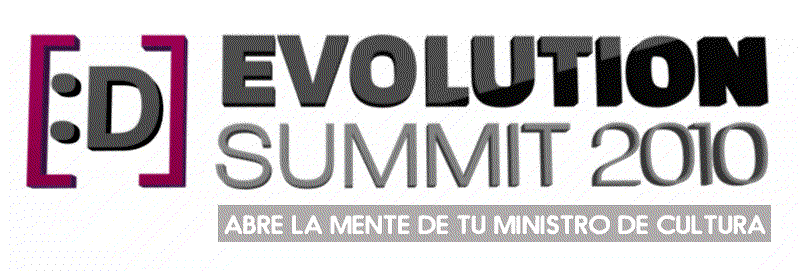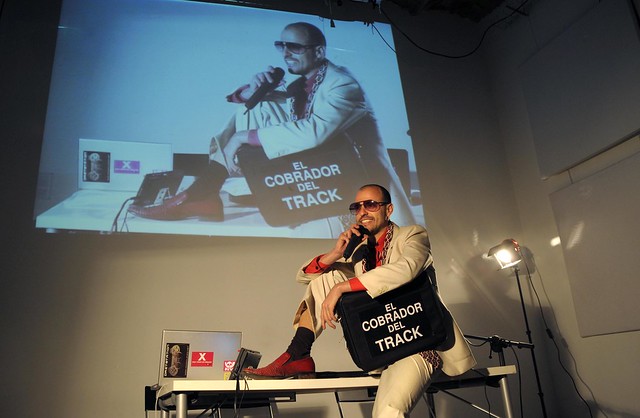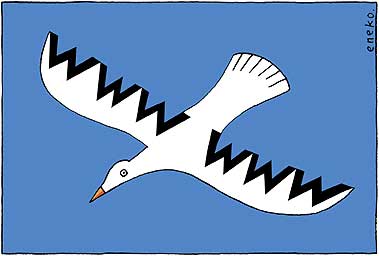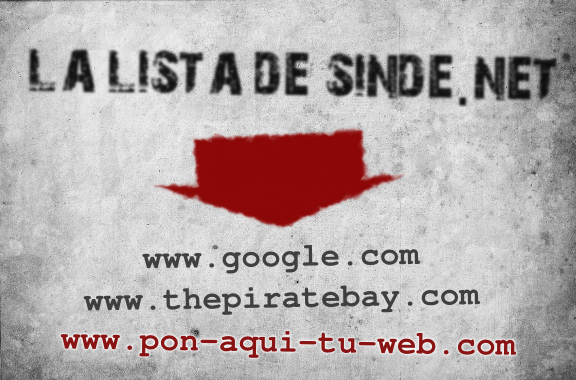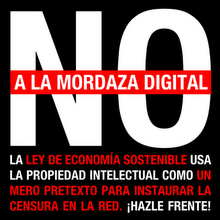THE END OF IMPUNITY
Ministerial Summits are not what they used to be
Videos, images, events and press clippings
Barcelona hosted the summit of Ministers of Culture from the 27 European Union countries, and their meeting with the Forum of Cultural Industries.
The parallel citizen summit, the (D’) Evolution Summit – which was organized in order to put forward specific proposals and urgent demands on fundamental rights in Internet, and to give a real-time account of what was being said inside the official congress – allowed civil society to keep an eye on what was being said about its future.
Here are some details which, as we will see below, are… “representative”:
More than 5000 people were able to connect to the live internet broadcast, and 700 social networks worked spontaneously to ensure that the information circulated immediately.. Tens of thousands of blogs helped to spread (D’) Evolution…
The fictional character the Tracks Collector, an artist who tries to collect his legitimate royalties generated by works licensed under Creative Commons, which the cultural industries do not want to pay him, attracted more than 1000 fans in a single day.
The (D’) Evolution action with Leo Bassi titulada “No pagaremos el pato/We will Not Carry the Can for a cultural industry that does not want to reinvent itself was the lead image in all the papers.
Every day, half an hour after the end of each session at the Forum on Cultural Industries, we broadcast the edited highlights with live commentary. The edit showing Eduard Punset directly addressing the Spanish Minister, Ángeles González Sinde, which we posted online with the title La Lección de Punset/Punset’s Lesson had 90,000 visits in the first two days, making it one of the 5 most-watched videos on the net. It has now exceeded 150,000 visits.
To help us understand what they had come to Barcelona for, D’Evolution Summit had a day-by-day broadcast with commentary in (almost) real time of what the ministers and industries have said.
So for them, things didn’t go as planned.
We were able to verify, live, that when they are watched over, our rulers are not able to favour private interests with impunity, or to implement simplistic control policies based on obsolete formulas.
What we saw:
1 – The speeches supporting the interests of lobbies start to get a bit uncomfortable. What they usually do behind closed doors (and will continue to do). turns against them when it is discussed in public and has to contend with arguments.
This is why:
a) The grand speeches aimed at industry heavyweights, promising to get rid of anything that is not controlled by the multinational industry that is monopolizing and hindering the circulation of knowledge, have been strongly contested by civil society which responded in real time, by wise men like Punset and Bauwens, by a section of some industry participants in the forum who are already working on new formats and by a few of the cultural leaders from the 27 countries, who do not always share the simplistic propaganda they are dealt. We saw how in only 24 hours, the aggressive, manipulative speech with which Sinde and her warriors Van Damme (Guillermo Corral) and Mercedes Elvira del Palicio opened the Forum, turned into ambiguous and regretful speeches, in which nothing precise is said.
b) The EU Commission on Culture and Education decided not to present the Green Book on Cultural Industries during the meeting in Barcelona, as had been previously announced. Since February, they knew that the meeting would be contested on copyright issues, and we were informed that they would not present the conclusions in order to avoid “affecting internal equilibrium”. So we know that the taliban discourse is being discussed internally and we’re glad.
2 – Another phenomenon that was fascinating to watch is how, with an absent gaze, grasping at a pre-digital imaginary in a world that has already overtaken them in intelligence and capacity, they go around in circles discussing representativity. .
In Spain alone, right now, there are at least 300,000 people actively and openly working to defend their rights in the digital environment:
The Manifesto in Defense of Fundamental Rights on the Internet has been published and adopted by over 150,000 webs in Spanish, and translated into 10 languages.
Its page on FaceBook currently has more than 230,000 members.
RedSOStenible has the support of 27,400 web sites.
Sinde’s List, a list of web sites that self-report themselves for supposedly including illegal links, is now 1391 pages long.
But the warrior Van Damme, who was not voted into his position, defends unpopular laws like Sinde’s Law, saying that the proposals coming from civil society “don’t represent anybody”. Another person who uses this argument is Andrés Dionis, the new director of theCoalition of Creators, the lobby supporting the Sinde’s Law. Andrés Dionis says that these 300,000 people who are protesting don’t represent anybody because they are not a political party or association. This is specially odd when he himself represents an association called the “Coalition of Creators” which does not have a single creator as a member. Not even God.
In the current political system there are 2 key things that can irredeemably tip the balance one way or another. One of them, civil society has no access to: Money. But civil society does have access to the other thing. This second thing is precisely about “representatitvity”, which has changed its meaning since the Internet started to allow direct democracy: Votes. A thing is only representative if somebody feels represented by it. The Internet represents itself, it speaks loud and clear. Each and every one of the 300,000 people who protest do not represent, but simply are, this mass movement. There is no longer a need for vertical associations in order to make ourselves heard. Passive delegation is over, whether they like it or not. We elect people every four years so that they can work in the service of the common good. The Internet has a Memory and it will remember those who work against Internet without the consensus of those who they “represent”.
Citizens have asked to be heard, and put forward solutions. The Ministries have denied an audience, and ignored the solutions. But the answer has been brought to us loud and clear by the ninja Van Damme (Guillermo Corral): This is war. “We have to win the Internet war”.
Politicians declare war on their constituents. If they want war, they will get war. A war where there may be no blood, but what is at stake is the intellectual and economic devastation of digital development, handed over to directors and entrepreneurs who defend obsolete monopolies and don’t allow anything else to grow around it.
There is no doubt that this war will be won by civil society, just as the earth was eventually proven to be round and women ended up winning the vote. The question is when, and how much suffering and obscurantism we will be able to avoid.
As our Minister of Culture aptly put it, “we are living through times that are crucial to the future of humanity” THey have been able to choose whether to go down in history as a driving force behind the splendour of the digital era, or as the Torquemada of the 21st century.
Fine. And we continue.
Two upcoming dates on the calendar. The first: we’ll see them in the Spanish Parliament, in the discussion of the Law of Sustainable Economy.
And the other, essential appointment, in Granada, where the EU Ministers of Telecommunications and the Information Society will meet. We will be there, because THE INTERNET WILL NOT BE ANOTHER TV.
And now some photos and print news (which is the only news the ministers read).
El País 1
El País 2
La Vanguardia 1
El País 3
Público 1
El País 4
Público 2
El País 5
20 Minutos 1
El Periódico 1
El Jueves
EuropaPress
RTVE
VilaWeb
El Periódico 2
El País 6
El País 7
ABC
Noticias.Com
20 Minutos 2
PortalTic
El País 8
Telecinco
ABC 2
20Minutos 3
El Mundo
El Mundo 2
Rebelión
20Minutos 4
Público 3
Diagonal
El País 9
Thetrendnet
Avui
El Mundo3
El Punt
La Gaceta Tecnológica
La Razón
La Vanguardia2
El Periódico3
El Punt2
NO A LA LEY SINDE
NO AL CIERRE DE WEBS
INTERNET TIENE MEMORIA
Pictures by: Eloisa D’Orsi, Xose Quiroga and Héctor Julio Oca González.
